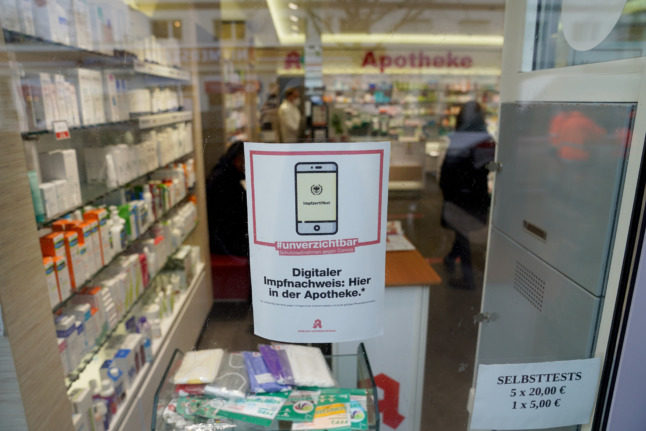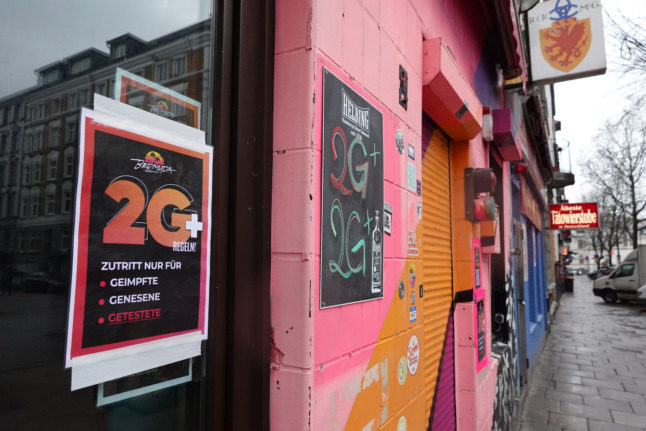What’s going on?
At their first meeting of the 2022, Chancellor Olaf Scholz and the heads of the states were facing a complex and in some ways unique situation. The highly transmissible Omicron variant is spreading rapidly and is already dominant northern states like Schleswig-Holstein and Bremen. In the country as a whole, it accounts for about 45 percent of new cases – and is expected to take over from Delta in the coming days.
Though early evidence suggests that Omicron tends to cause a milder illness than many previous variants, other things we know about the new variant are more concerning.
The first is that, with its high number of mutations, the variant seems to have the ability to bypass existing immunity relatively easily, meaning that even vaccinated and recovered people could be likely to contract it (though those who have booster jabs are believed to be well protected).
The second is the sheer ferocity with which Omicron has spread in countries like the United States and France, whether health authorities are currently recording hundreds of thousands of new cases a day.
READ ALSO: Omicron spreads in Germany as Covid infections surge
In particular, fears have been growing about the impact a wave of Omicron infections could have on vital infrastructure and services like the police, healthcare and fire brigade in the coming months.
If a significant proportion of the population is self-isolating due to getting Omicron or having contact with someone who had Omicron, it could lead to disruptions and gaps in vital services. At the same time, a high number of infections could also lead to a high number of deaths by increasing the likelihood that vulnerable people are exposed to the virus.
This complex juggling act is the reason the government is planning to tighten up some rules while also relaxing others.
What are the current rules in Germany?
Though some states have opted to enforce stricter rules, a minimum standard applies nationally for how public spaces should manage their entry policies during the pandemic.
For the vast majority of public indoor spaces, such as cinemas, bars and non-essential shops, a ‘2G’ policy applies, meaning unvaccinated people are barred from entering. In the workplace and on public transport, this changes to a ‘3G’ rule, meaning people must have a certificate of vaccination or recovery or a negative test with them.
Clubs and discos were forced to close nationally on December 28th and currently remain shut.
What’s been decided?
- 2G-plus in restaurants, cafes and bars
Currently, a mandatory ‘2G’ rule – meaning access only for vaccinated (geimpft) and recovered (genesen) was in place in bars, restaurant and almost all other public indoor venues. State governments were able to make this stricter if they wanted, but there was no obligation to do so.
Now, the government is bringing in a stricter 2G-plus system nationwide, meaning people must show a negative antigen or PCR test as well as proof of vaccination and recovery in order to enter any of these venues. People who’ve had a booster jab are exempt from the testing requirement.
READ ALSO: Germany considers tighter Covid restrictions in restaurants
- Shortening quarantine
To prevent a massive wave of absences impacting public services and infrastructure, politicians have decided to shorten the period of mandatory quarantine for people who catch Covid.
Currently, people have to isolate for up to 14 days after catching Covid or having close contact with someone who has – with time-frames varying depending on the variant and the person’s vaccination or recovery status.
In the case of Omicron, staying in quarantine for the full two weeks is mandatory, even if you’re fully vaccinated or have tested negative.
On Friday, ministers decided to change the rules so that people can now escape quarantine from the seventh day with a negative antigen or PCR test. People who’ve had a booster jab will also be exempt from the obligation to quarantine after having contact with someone who has Covid.
READ ALSO:
- German government changes Covid quarantine rules
- EXPLAINED: What are the current Covid rules in Germany around quarantine?

When will this come in?
According to reports in Tagesspiegel, the date at which the new rules are set to come in hasn’t been determined yet since the official ordinance hasn’t yet been written. However, January 15th is a date being bandied around at the moment.
Whenever the government decides to bring in the new rules, we can probably expect it to be sooner rather than later, since ministers are keen to get measures in place as soon as possible to slow the spread of Omicron.
What about vaccine mandates and contact restrictions?
Two issues that were notably absent from the agenda in Friday’s meeting were further contact restrictions and vaccine mandates.
At another meeting of state and federal leaders in November, Chancellor Olaf Scholz (SPD) came out in favour of mandatory jabs for the general population. But the controversial idea seems to have been sidelined in Friday’s meeting.
Scholz did say, however, after the meeting that all state premiers supported a general vaccine mandate, signalling this topic will be discussed further in the coming weeks.
Meanwhile, Health Minister Karl Lauterbach (SPD) has been calling for more contact restrictions in recent days. Before Christmas, the rules were tightened so that up to 10 vaccinated and recovered people were allowed to meet indoors at a time, while unvaccinated people are only allowed to meet up to two other people from one further household.
However, ministers don’t seem to have been able to agree if and how to toughen up the rules, so nothing seems to be changing on that front for now – unless states opt to introduce their own tougher rules independently.



 Please whitelist us to continue reading.
Please whitelist us to continue reading.
Member comments